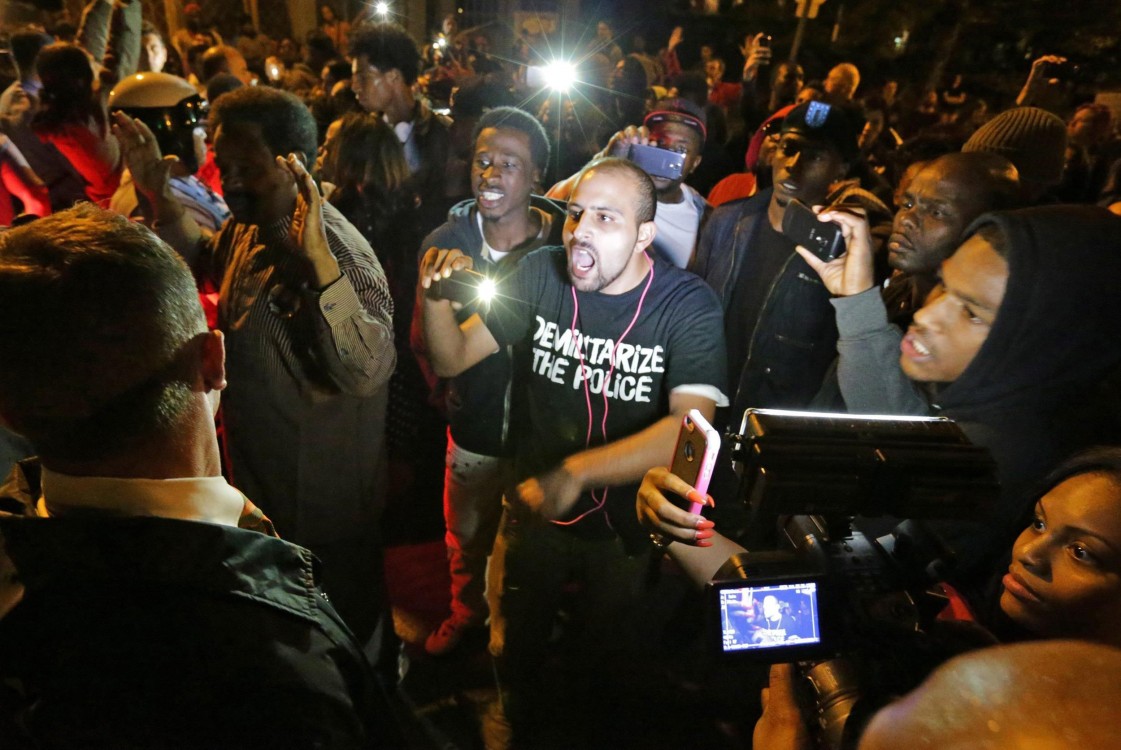
It's been over a month since 18-year-old Vonderrit Myers, Jr. was killed by a St. Louis police officer. Details offered of the moments that led up to his death are today still sparse and sometimes conflicting. An investigation is underway, but there are already a few aspects of the incident that should raise questions.
First, Myers was shot eight times, six of which were from behind. Second, the person who shot Myers was an off-duty cop working security for a private company. That the officer who killed Myers was off duty isn't immediately as troubling as the fact that the 18-year-old was shot six times in the back. It is, though, just as curious and essential to understanding what might happen next in the case.
The term "secondary police officer" peppered headlines with ease as news of Myers's killing broke. The shadowy practice it describes, however, is fairly obscure.
In essence, secondary policing is the practice by which municipalities allow their active officers to moonlight as private security during off hours. Officers are generally allowed to wear their official uniforms, carry the weapons issued to them by their municipalities and maintain all the powers of an active, on-duty police officer. They can search, seize, arrest and use deadly force, but they execute those powers partly under the direction of a private entity. It's renting a cop—literally. And for renting out officers, many police departments earn considerable commissions.
According to one expert, secondary employment is "so ingrained in the law enforcement profession that in some states, by law, police agencies cannot prohibit it." In fact, 83 percent of all the nation's police departments have written policies for secondary employment, according to the Bureau of Justice Statistics. Demand for security services is high and municipalities—many struggling with reduced budgets—have a supply of trained, available personnel. Not to mention cops could use the extra money.
According to the U.S. Bureau of Labor Statistics' May 2013 Occupational Employment and Wages report, police officers across the country make, on average, just $28.23 an hour. Paid details nearly match that and ultimately supplement an officer's annual income. Perhaps most important though is that residential communities and businesses want the security. In fact, a 2013 United Nations reportfound that the private security industry is booming globally, growing at 7.4 percent a year and on target to balloon to a $244 billion by 2016.
What's unclear, however, is exactly for whom do these off-duty cops work. Is it the residential organizations and companies footing the bill for their security services, or their municipalities and taxpayers? During the Myers incident, under what authority did the officer initiate contact with him and, ultimately, pull the trigger? And, if Myers's killing wasn't justified, who is liable? Who is accountable?
The St. Louis Metropolitan Police Department (SLMPD) released a brief statement in the wake of Myers's death that read, "The officer, while not on duty for the Police Department, still has the same responsibilities and power to affect arrest and the officer operates in the capacity as a St. Louis Police Officer."
But the mere fact that a person is employed by a police agency does not transform all of their actions into law enforcement actions, even if they relate to policing. Perhaps with that in mind, the SLMPD mandates that all employers hiring out officers sign a form that releases the city and its officers from all legal responsibility in the case that anything goes wrong during the secondary shifts.
The SLMPD does not, however, have a policy that dictates officer conduct, duties and responsibility while on their second jobs.
"Companies hire police officers to security work because they're trained officers. There is no additional training," St. Louis police spokeswoman Schron Jackson told Gawker. "When they're working secondary, they're working as they would on duty and they do what they need to do to remain safe."
When asked whether or not the SLMPD is reconsidering its policies and practices around secondary policing in the wake of the Myers incident, Jackson declined to comment, citing the ongoing investigation.
Researchers are currently unable to measure the scale of corruption and abuses in secondary policing. There is no comprehensive data collection in general for things like police use of force. Compounding that, there is little to no distinction made between on-duty and secondary police work. Still, there is some evidence to suggest that the practice is rife with problems.
A study by researchers with the Malcolm X Grassroots Movement found that 313 black people were killed by police, security guards, and vigilantes in 2012. It is a conservative estimate, gathered from data made available from just a percentage of the 18,000 state and local law enforcement agencies in the United State. Of the 313, 35 were killed by security officers or off-duty cops.
In addition, The U.S. Department of Justice's Civil Rights Division identified issues with secondary policing during its 2011 investigation of the New Orleans Police Department. In an official report, the department called the NOPD's Paid Detail Unit an "aorta of corruption" and maintained that its loose structure undermined the quality of NOPD policing, facilitated abuses, contributed to officer fatigue and inequitable policing, and acted as a financial drain on the department.
The NOPD isn't alone. The New York City Police Department, the largest police department in the United States, has also had trouble with its mysterious Paid Detail Unit in recent years.
Nearly half the NYPD's 22,000 street cops have registered with the unit, which pays off-duty officers $30 an hour for shifts that can range from four to 12 hours. New York City gets a 10 percent administrative fee on top of what's paid to officers, according to reports. The City's 2011 budget outlined $1,184,000 in fees from paid details, suggesting that officers earned about $11.8 million in total for private, off-duty police work.
Last November, after an onslaught of racial profiling cases were filed against New York-based department stores and the NYPD, state legislators drafted a bill to reform the Paid Detail Unit. The Retail Anti-Profiling Act's goal was, in part, to create transparency around the services NYPD officers provide to private companies.
"It's time to open the black box that's NYPD policing at private businesses," said State Senator Daniel Squadron when announcing the bill. "Profiling in any circumstance is deeply unacceptable—and it's particularly disturbing when we don't even know the NYPD's role or policies in Barneys, Macy's, or countless businesses around our city."
The Retail Anti-Profiling Act is currently stalled in the New York State Assembly.
Back in St. Louis, attorneys for the family of Vonderrit Myers are interested in the policies of GCI Security, the company for which the officer who shot Myers was working. But will a legal battle over Myers's killing put secondary policing on trial?
GCI Security, formerly Hi Tech Security, has a history of lawsuits. In fact, the company changed owners and its name in 2011 after a series of personal injury lawsuits from people its officers allegedly brutalized in the process of arrest. In one case, a mentally ill man was left with brain injuries and partially paralyzed after allegedly being struck in the head by an off-duty St. Louis officer working for Hi Tech. That case, and others involving the company, was settled out of court. None of the incidents resulted in criminal charges against the officers and the company continued to operate with a license from the St. Louis Metropolitan Police Department and contract its officers.
When contacted by Gawker, a representative for GCI Security declined to give comment on the Myers incident, citing the pending investigation.
Jermaine Wooten, an attorney for the family of Vonderrit Myers, said the officer's behavior the night he killed the 18-year-old boy is central to the private investigation into the incident.
"It appears as the the officer was hired to patrol one block. He had no business two blocks over from where he was assigned," Wooten told me. "I'm speculating, but it appears that this guy just got bored going up and down that block and wanted some action. He saw some guys, hanging in their own neighborhood, and decided they were suspicious."
Details of what happened next are still fuzzy and being investigated by both SLMPD and private investigators working on behalf of the Myers family. Wooten says what's clear, however, is that the way secondary policing is executed in St. Louis contributed the events of that night.
"It doesn't appear to be regulated in any real fashion," said Wooten. "What kind of protocol is in place for any officer—a regular officer or one performing secondary work—to approach multiple suspicious people alone? The bottom line is that policy has to be created and communicated, training has to be performed before these people are sent out into the streets."
3 WAYS TO SHOW YOUR SUPPORT
- Log in to post comments












